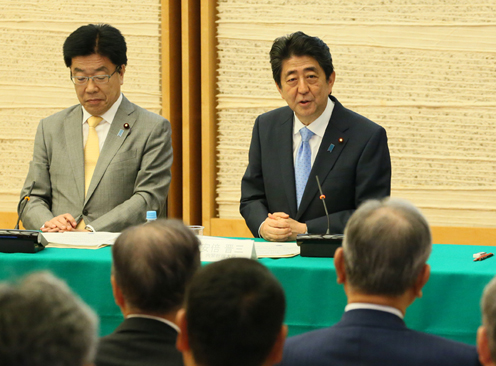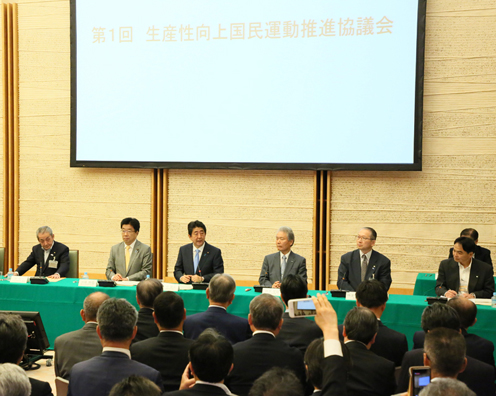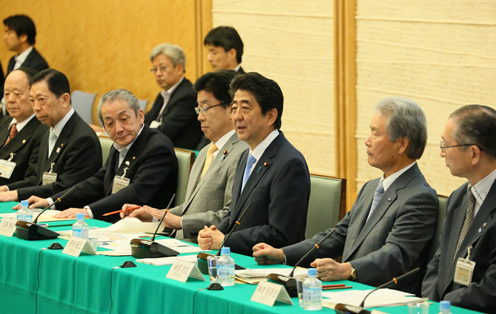Home > News > The Prime Minister in Action > May 2017 > Council on the Promotion of the National Movement to Improve Productivity
The Prime Minister in Action
Council on the Promotion of the National Movement to Improve Productivity
May 24, 2017
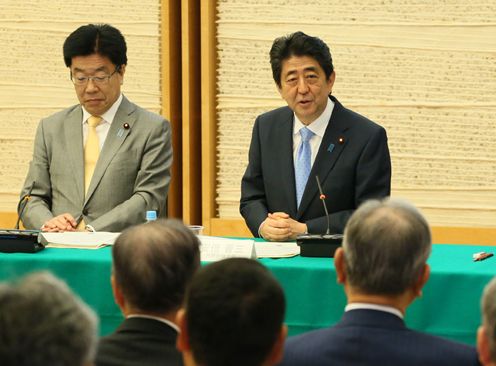
Photograph of the Prime Minister making a statement (1)
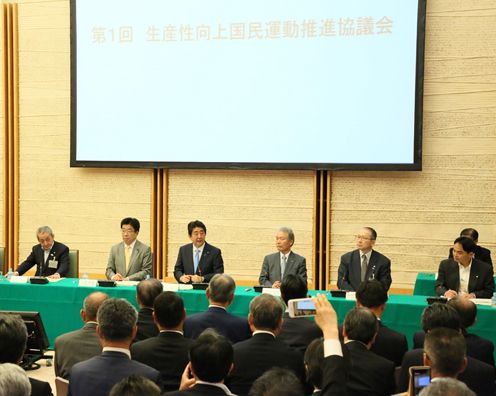
Photograph of the Prime Minister making a statement (2)
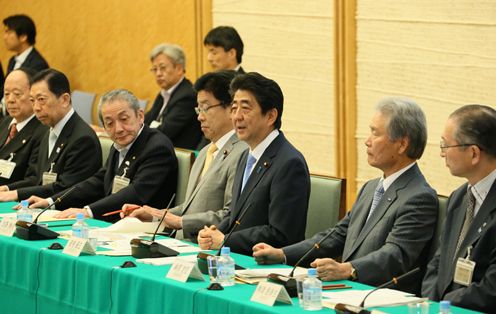
Photograph of the Prime Minister making a statement (3)
[Provisional Translation]
Prime Minister Shinzo Abe held the first meeting of the Council on the Promotion of the National Movement to Improve Productivity at the Prime Minister's Office.
At the meeting, reports were given on initiatives for the improvement of productivity.
The Prime Minister said in his opening address,
"Today, from all corners of Japan, business owners who are busy with management on a day-to-day basis together with representatives of business organizations have gathered here in order to promote an all-Japan effort to improve productivity.
Thanks to Abenomics, major improvements have been achieved related to corporate earnings and employment, and nominal GDP has reached its highest level ever. This year's spring employer-employee negotiations saw the continuation of the wage hike trends of the previous three years, with many companies raising wages across the board for the fourth consecutive year.
On the other hand, with the economic recovery brought about by Abenomics, overcoming personnel shortages has become a major issue for business owners. I think this is difficult for small businesses, those in the service industry, and people involved in the management of companies in the regions. The only way to overcome this issue is to improve labor productivity.
In addition, in cooperation with management and labor representatives, the Government is now promoting work style reform, including placing restraints on the practice of long working hours. In order to alleviate personnel shortages by making workplaces attractive, we must move forward with work style reform. On the other hand, as I have heard from SME groups, we must advance reforms for productivity improvements for this purpose as well.
All of you were gathered here at the Prime Minister's Office two years ago. Since then, you have been working for productivity improvements. Today, I would like to hear your reports about the initiatives you have all implemented over the past two years.
Today, the Abe administration is establishing the Council on the Promotion of the National Movement to Improve Productivity. We will undertake in a unified manner work style reforms as well as reforms for productivity improvements and reforms to foster personnel. I would like to request everyone's cooperation with this."
In addition, lastly, based on the day's reports, the Prime Minister said,
"I would like to first express my gratitude to the advisers, including advisors from Toyota Motor Corporation and Canon Inc., who cooperated with our case study research at 67 companies across Japan, as well as the managers of the companies that accepted the advisors. We will prepare certificates of participation today for everyone who participated.
It was the movement for productivity increases in the manufacturing industry, symbolized by kaizen (continuous improvement) activities, that led Japan's high-speed economic growth after World War II.
The need for raising productivity in labor intensive industries has been pointed out for many years, but efforts have not been very successful up to this point. Today, however, we have confirmed that if we implement initiatives like the ones contained in this report, sales will rise visibly, the burdens placed on employees will shrink, and productivity will improve.
Toyota undertook helping to reduce the production failure rate of fried tofu, and Canon helped to streamline the cutting and wrapping of cabbages. I suppose that the companies accepting advisers may have felt somewhat that the work of the advisers was not related to their own, or wondered if an automobile maker really knew about food. I would like to express my gratitude to everyone who overcame these barriers and accepted advisers with the strong will to improve productivity. I also want to communicate my gratitude to everyone who accepted appropriate advice.
Today, I have been able to see for myself how to undertake productivity improvements, and what kind of results can be produced. I believe that everyone gathered here has also become convinced that productivity can be improved even at small regional businesses. I think it has become clear from today's presentations that the manufacturing industry and the service industry are not different.
I look forward to the reports at the next meeting on effective initiatives in the truck transport segment, the lodging segment, and the nursing care segment.
I do not want all of this to be limited to five segments. I would like to consider expansion to other manufacturing segments confronting personnel shortages as well. To that end, we will make all-Government actions for the productivity improvement movement. Through productivity improvements, burdens placed on workers will decrease, while at the same time sales will increase and wages will rise. As these initiatives will make everyone happy, I absolutely want to promote them. I myself will take the lead on the development of this Council on the Promotion of the National Movement to Improve Productivity. Let's work together and give our utmost efforts."

